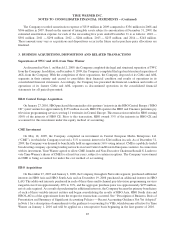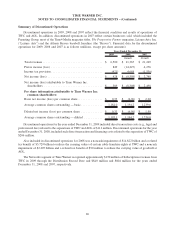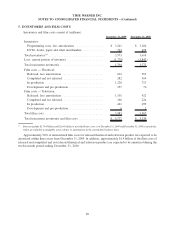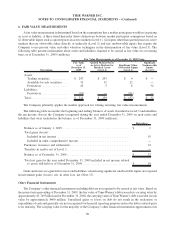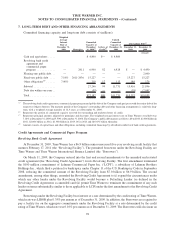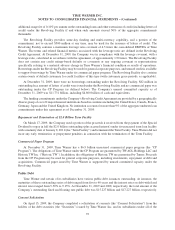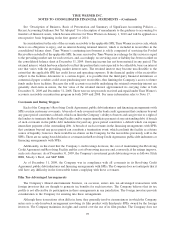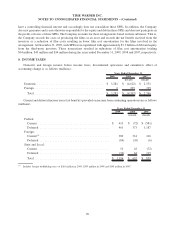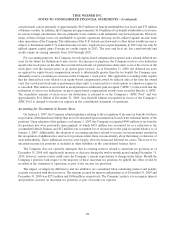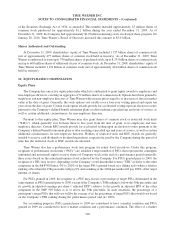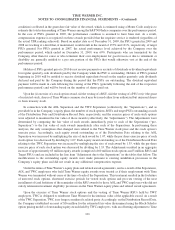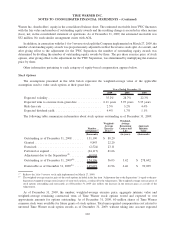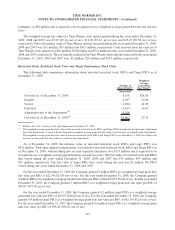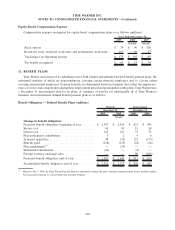Time Magazine 2009 Annual Report Download - page 107
Download and view the complete annual report
Please find page 107 of the 2009 Time Magazine annual report below. You can navigate through the pages in the report by either clicking on the pages listed below, or by using the keyword search tool below to find specific information within the annual report.See “Description of Business, Basis of Presentation and Summary of Significant Accounting Policies —
Recent Accounting Guidance Not Yet Adopted” for a description of amendments to the guidance to accounting for
transfers of financial assets, which became effective for Time Warner on January 1, 2010 and will be applied on a
retrospective basis beginning in the first quarter of 2010.
In consideration for the sale of the accounts receivable to the applicable SPE, Time Warner receives cash, which
there is no obligation to repay, and an interest-bearing retained interest, which is included in receivables in the
consolidated balance sheet. Time Warner’s continuing involvement is solely comprised of servicing the Pooled
Receivables on behalf of the applicable SPE. Income received by Time Warner in exchange for this service is equal
to the prevailing market rate for such services, and, accordingly, no servicing asset or liability has been recorded on
the consolidated balance sheet at December 31, 2009. Servicing income has not been material in any period. The
retained interest, which has been adjusted to reflect the portion that is not expected to be collectible, bears an interest
rate that varies with the prevailing market interest rates. The retained interest may become uncollectible to the
extent that the applicable SPE has credit losses and operating expenses. If the financial quality of the receivables
subject to the facilities deteriorate to a certain degree, it is possible that the third-party financial institutions or
commercial paper conduits could cease purchasing new receivables, thus limiting the Company’s access to future
funds under these facilities. Because the sold accounts receivable underlying the retained ownership interest are
generally short-term in nature, the fair value of the retained interest approximated its carrying value at both
December 31, 2009 and December 31, 2008. There were no net proceeds received and repaid under Time Warner’s
accounts receivable securitization program in both 2009 and 2008. For more information refer to Note 17.
Covenants and Rating Triggers
Each of the Company’s Revolving Credit Agreement, public debt indentures and financing arrangements with
SPEs contain customary covenants. A breach of such covenants in the bank credit agreement that continues beyond
any grace period constitutes a default, which can limit the Company’s ability to borrow and can give rise to a right of
the lenders to terminate the Revolving Facility and/or require immediate payment of any outstanding debt. A breach
of such covenants in the public debt indentures beyond any grace period constitutes a default which can require
immediate payment of the outstanding debt. A breach of such covenants in the financing arrangements with SPEs
that continues beyond any grace period can constitute a termination event, which can limit the facility as a future
source of liquidity; however, there would be no claims on the Company for the receivables previously sold to the
SPEs. There are no rating-based defaults or covenants in the Revolving Credit Agreement, public debt indentures or
financing arrangements with SPEs.
Additionally, in the event that the Company’s credit ratings decrease, the cost of maintaining the Revolving
Credit Agreement and Revolving Facility and the cost of borrowing increase and, conversely, if the ratings improve,
such costs decrease. As of December 31, 2009, the Company’s investment grade debt ratings were as follows: Fitch
BBB, Moody’s Baa2, and S&P BBB.
As of December 31, 2009, the Company was in compliance with all covenants in its Revolving Credit
Agreement, public debt indentures and financing arrangements with SPEs. The Company does not anticipate that it
will have any difficulty in the foreseeable future complying with these covenants.
Film Tax-Advantaged Arrangements
The Company’s filmed entertainment business, on occasion, enters into tax-advantaged transactions with
foreign investors that are thought to generate tax benefits for such investors. The Company believes that its tax
profile is not affected by its participation in these arrangements in any jurisdiction. The foreign investors provide
consideration to the Company for entering into these arrangements.
Although these transactions often differ in form, they generally involve circumstances in which the Company
enters into a sale-leaseback arrangement involving its film product with third-party SPEs owned by the foreign
investors. The Company maintains its rights and control over the use of its film product. The Company does not
95
TIME WARNER INC.
NOTES TO CONSOLIDATED FINANCIAL STATEMENTS – (Continued)


